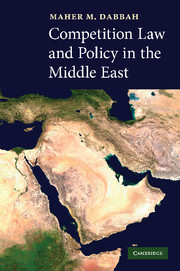Book contents
- Frontmatter
- Contents
- Preface
- List of abbreviations
- 1 Introduction
- 2 The relationship between Islam and competition law and policy
- 3 Israel: the region's oldest competition law
- 4 Turkey: a European dream from the other side of the border
- 5 The Arab Maghreb countries
- 6 Jordan's 2004 Competition Law
- 7 The Gulf States: a possible model for regional cooperation
- 8 The Arab Republic of Egypt: the chase after globalisation
- 9 Lebanon and Syria: a tale of two states
- 10 Conclusions
- Index
3 - Israel: the region's oldest competition law
Published online by Cambridge University Press: 20 July 2009
- Frontmatter
- Contents
- Preface
- List of abbreviations
- 1 Introduction
- 2 The relationship between Islam and competition law and policy
- 3 Israel: the region's oldest competition law
- 4 Turkey: a European dream from the other side of the border
- 5 The Arab Maghreb countries
- 6 Jordan's 2004 Competition Law
- 7 The Gulf States: a possible model for regional cooperation
- 8 The Arab Republic of Egypt: the chase after globalisation
- 9 Lebanon and Syria: a tale of two states
- 10 Conclusions
- Index
Summary
Israel is in many ways a unique country and society. Located at the heart of the Middle East, the country ‘officially’ shares hardly any commonalities with other MECs, though to a certain extent similarities in culture do actually exist. The population in the country has a very interesting representation of all types of backgrounds and faiths and in this way it is considered to be a multicultural society though special emphasis has been placed on preserving the Jewish character of the state. Diversities in the case of Israel also exist in relation to regional economic development within the country: the differences between certain cities and towns and many villages in the country are extremely vast whether in terms of economic development or cultural patterns. The former are more economically driven and developed whereas the latter – being small local communities – more than anything else are culturally driven and significantly underdeveloped. Such divergences are problematic not necessarily just in political or social terms but also in competition law terms given the huge task in building a competition culture throughout the country which rests on unified, common standards advocated by a central body, the Israel Antitrust Authority. These are serious intrinsic factors bound to affect not only the existence of competition law but also its enforcement and the spreading of a competition culture throughout the country.
- Type
- Chapter
- Information
- Competition Law and Policy in the Middle East , pp. 34 - 77Publisher: Cambridge University PressPrint publication year: 2007

